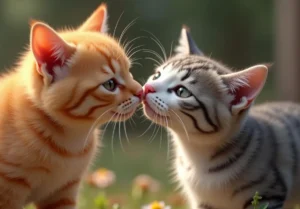Cats can be mysterious creatures, but one thing’s for sure – finding their feces on your lawn is never a pleasant surprise. So, why are cats pooping on your lawn? The answer may be simpler than you think.
Understanding Cat Behavior
Cats are notorious for their independent nature and strong territorial instincts. When a cat decides to use your lawn as their personal bathroom, it could be due to a variety of reasons. One common explanation is that they are marking their territory. By leaving their scent in a prominent location like your lawn, they are communicating to other cats in the area that this space belongs to them.
Additionally, cats are creatures of habit. If a cat has found your lawn to be a comfortable and accessible spot for relieving themselves, they are likely to continue doing so unless this behavior is addressed. It’s also essential to consider that outdoor cats may not have access to a suitable litter box indoors and may see your lawn as a convenient alternative.
Understanding these behaviors can help you develop strategies to deter cats from using your lawn as a litter box. By identifying the root cause, you can implement targeted solutions to encourage cats to find alternative bathroom spots that are more suitable for both them and your lawn.
Possible Reasons for Cat Pooping on Your Lawn
Lack of Suitable Litter Box : Cats have specific preferences when it comes to their bathroom preferences. If a cat doesn’t have access to a clean, private, and appropriate litter box, they may seek out alternative locations like your lawn.
Territorial Behavior : As mentioned earlier, cats are territorial creatures. By leaving their waste on your lawn, they are marking their territory and communicating with other cats in the area.
Outdoor Cats : Cats that roam freely outdoors may not have a designated bathroom area. Your lawn may be the most convenient spot for them to relieve themselves.
Stress or Anxiety : Changes in a cat’s environment or routine can cause stress and anxiety, leading to inappropriate bathroom behaviors. Identifying and addressing the source of stress can help mitigate this issue.
Health Problems : In some cases, cats may choose to relieve themselves outside due to underlying health issues. If you suspect your cat is not using the litter box due to health problems, consult with a veterinarian for proper diagnosis and treatment.
By considering these potential reasons for why cats are pooping on your lawn, you can take proactive steps to address the behavior and create a more comfortable environment for both your feline visitors and your lawn. Remember, patience and understanding are key when dealing with cat behavior issues.
Deterrents for Keeping Cats Away
Are you tired of finding surprise gifts from neighborhood cats on your lawn? Here are some effective ways to deter them from using your yard as their personal restroom: – Citrus peels: Cats hate the smell of citrus, so scatter citrus peels around your yard to keep them away. – Motion-activated sprinklers: Install motion-activated sprinklers that spray water when they detect movement, scaring off any unwanted feline visitors. – Chicken wire: Lay down chicken wire on your soil or mulch to make it uncomfortable for cats to walk on. – Commercial deterrent sprays: Look for cat repellent sprays at your local garden center or pet store to discourage cats from entering your yard. – Ultrasonic devices: Consider using ultrasonic devices that emit high-frequency sounds only cats can hear, deterring them from coming into your yard. Remember, consistency is key when using these methods. It may take some time, but with patience and persistence, you can keep those pesky cats away from your lawn.
Health Risks of Cat Feces in Your Yard
Did you know that cat feces in your yard can pose health risks to you and your family? Here’s what you need to know: Cat feces can contain parasites like Toxoplasma gondii, which can be harmful to pregnant women and people with weakened immune systems. To reduce the risk of exposure: – Wear gloves: When cleaning up cat feces, always wear gloves to protect yourself from any potential pathogens. – Use a scooper: Use a scooper or shovel to carefully scoop up the feces and dispose of it in a sealed plastic bag. – Avoid bare skin contact: Avoid direct contact with cat feces, as it can lead to the transmission of diseases. – Clean and disinfect: Thoroughly clean and disinfect the area where the feces was found to eliminate any remaining bacteria or parasites. Properly disposing of cat feces and taking precautions while cleaning can help keep you and your loved ones safe from any potential health hazards associated with cat waste.
Working with Your Neighbors
Are you tired of finding surprises in your lawn left by the neighborhood cats? It’s time to chat with your neighbors about the furry culprits. Politely informing them about the issue can lead to a collaborative solution. Suggest they keep their cats indoors or provide a designated litter area in their own yards. By working together, you can create a more harmonious neighborhood where everyone’s outdoor space is respected.
Creating a Cat-Friendly Space
Want to minimize the impact of cats using your lawn as a bathroom? Consider setting up a cat-friendly area in a secluded corner of your yard. Fill it with loose soil or sand for digging, as cats prefer these textures for their bathroom needs. By directing the feline traffic to a specific spot, you can preserve the rest of your lawn. Additionally, planting catnip or cat grass in this area can attract the cats and encourage them to use it as their litter box. Remember, a little effort in creating a cat-friendly space can go a long way in keeping your lawn clean and free from unwanted surprises. Here are some tips to create a cat-friendly space:
- Use loose soil or sand for digging.
- Plant catnip or cat grass in the designated area.
- Consider setting up a small litter box specifically for outdoor cats.
- Add some cat toys or scratching posts to make the area more appealing.
By incorporating these elements, you can create a space that cats are naturally drawn to, encouraging them to use that area instead of your entire lawn.
Seeking Professional Help
If you find yourself at a loss on how to stop those pesky felines from using your lawn as a bathroom, it might be time to seek professional help. Animal control services or pest removal companies are equipped with the knowledge and tools to address the issue effectively. Don’t hesitate to reach out for assistance if the problem persists despite your best efforts. Remember, there’s no shame in asking for help when dealing with unwanted guests in your yard.
Interesting Facts About Cat Behavior
Did you know that cats are territorial creatures by nature? When they mark your lawn with their feces, they’re actually claiming it as their own territory. Understanding this behavior can help you devise strategies to deter them from using your lawn as a litter box. Another interesting fact is that cats are very clean animals and prefer to eliminate waste in areas that are quiet and secluded. This could explain why they are drawn to your peaceful lawn. By making your yard less inviting, you can encourage them to find a more suitable spot to do their business.
Key Tips: 1. Consider planting natural deterrents like lavender, rue, or rosemary to discourage cats from entering your yard. 2. Place physical barriers such as rocks or thorny bushes in areas where cats frequent to make it less appealing for them to visit. 3. Clean up any existing feces promptly to remove the scent and prevent cats from returning to the same spot. 4. Try using motion-activated sprinklers or ultrasonic devices to startle cats and deter them from coming back to your lawn.
Alex, a passionate animal lover, has experience in training and understanding animal behavior. As a proud pet parent to two dogs and three cats, he founded AnimalReport.net to share insights from animal experts and expand his knowledge of the animal kingdom.




